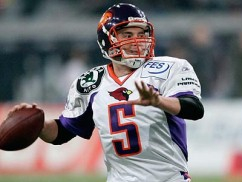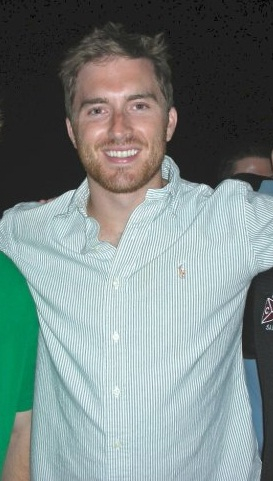
“Once you get out in the real world, nothing goes as planned. The best plan is to have options and see where they take you.”
After bouncing around the NFL to four teams in four years, Jeff Otis says he saw the writing on the wall for his professional football career — and it didn’t spell longevity. The quarterback played for the Arizona Cardinals, the Oakland Raiders, the Kansas City Chiefs, and the St. Louis Rams in that short time span, including one season in NFL Europe with the Frankfurt Galaxy. Nevertheless, Otis looks back on his time in the NFL with gratefulness for his experiences that most people can only dream of, not to mention the life lessons he learned after rubbing shoulder pads with teammate and mentor, Kurt Warner.
Now, as the former QB gets set to graduate next year with an MBA from the University of Virginia’s Darden School, he realizes that the lessons he learned on the field are identical to those taught in b-school. The most striking: letting go of the artificial sense of urgency to meticulously plan his life and career.
My Story:
I grew up in St. Louis, Missouri with my mother and father, one older brother and two older sisters where I played high school football. After high school, I was recruited by a cluster of schools. When the Division 1 offers weren’t rolling in, I started looking at some of the Ivy League schools like Harvard, Penn, and Columbia.
I enrolled in Columbia where I played football and earned my degree in Economics. After Columbia, I went undrafted, and, after some nibbles from the NFL and a contract with an arena football team, I signed a free agent agreement with the Arizona Cardinals in 2006. Almost immediately the Cardinals sent me to Europe to play for the Frankfurt Galaxy. Coming from a 1-AA school at Columbia, as opposed to one of the larger conferences, they needed to see what I could do first.
I played one season (approximately four months) with the Galaxy and we won the World Bowl. Kind of like the Super Bowl of Europe. Once I returned from Europe, I was ready for the 2006-2007season with the Cardinals, but the team drafted a Heisman Trophy quarterback from USC named Matt Lieinart.
From there, I saw the writing on the wall and how the NFL experience may turn out for me. I stayed with the team for about a year before I was clipped. A few months later, I signed—again as a free agent—with the Oakland Raiders, but was released before the regular season began in the fall of 2007.
That’s when I began thinking seriously about what I would do if I wasn’t playing football. My dad has been a real estate entrepreneur for almost 35 years, so I grew up with business in my blood and I always knew I wanted to follow in his footsteps as a businessman. One of my sisters and brother-in-law lived in Virginia and that’s how I started looking into the business community here.
I applied for and accepted an internship position with Tall Oaks Capital, an angel investment firm that makes small seed investments to help launch early-stage companies. Soon thereafter, the Oakland Raiders reached out to me and wanted to bring me back to the team.

I was called back to the NFL and spent the bulk of my career with the Raiders. I was fortunate enough to maintain my internship with Tall Oaks understanding that the NFL may not work out. As a bubble player, you may have a job one day and by that afternoon you are unemployed. You never know what’s going to happen and there is no job security.
Toward the end of the 2008 season, I kind of knew that I was ready to move on. I started studying for the GMAT to ante up for business school. I would have my GMAT prep book with me on road trips, studying hard for the entrance exam into b-school. After the season ended, I didn’t get re-signed, but I knew whether I was re-signed or not that I wanted to pursue the MBA.
Darden was at the top of my list. While I was waiting to get in, I was contacted by the St. Louis Rams. I went back to the league for a little bit, but once I got into Darden I said it’s definitely time to move on.
This is where I wanted to be. It sounds like marketing material, but there is something special about Charlottesville and something even more special about Darden. I’ve heard stories from students at other schools and people say their classmates can be truly cut throat. At Darden, students compete, but in the right way. As my career in the NFL progressed, I reached a point where I wanted everyone to be their best and to succeed. That’s a lot of how it is at here. The community works together to bring out the best in each individual even though we still compete with each other for jobs, grades, and, of course, the Darden Cup.
Darden is also a team atmosphere. Everyone is willing to leverage their expertise to help you thrive. Coming from football, that was very comforting. It’s not quite the locker room, but everyone has a hand in your education because they want to see you make it. This quality is also conducive to career changers like myself.









